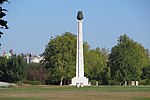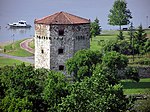Great War Island
Geography of BelgradeIUCN Category IVIslands of the DanubeRiver islands of SerbiaUninhabited islands of Serbia

Great War Island (Serbian: Велико ратно острво, Veliko ratno ostrvo) is a river island in Belgrade, capital of Serbia. It is located at the confluence of Sava and Danube rivers. Though uninhabited, the island is part of the Belgrade City proper, and belongs to the city municipality of Zemun.
Excerpt from the Wikipedia article Great War Island (License: CC BY-SA 3.0, Authors, Images).Great War Island
Nikola Tesla Boulevard, Belgrade New Belgrade (New Belgrade Urban Municipality)
Geographical coordinates (GPS) Address External links Nearby Places Show on map
Geographical coordinates (GPS)
| Latitude | Longitude |
|---|---|
| N 44.831632 ° | E 20.435798 ° |
Address
ПИО Велико ратно острво
Nikola Tesla Boulevard
11000 Belgrade, New Belgrade (New Belgrade Urban Municipality)
Central Serbia, Serbia
Open on Google Maps









